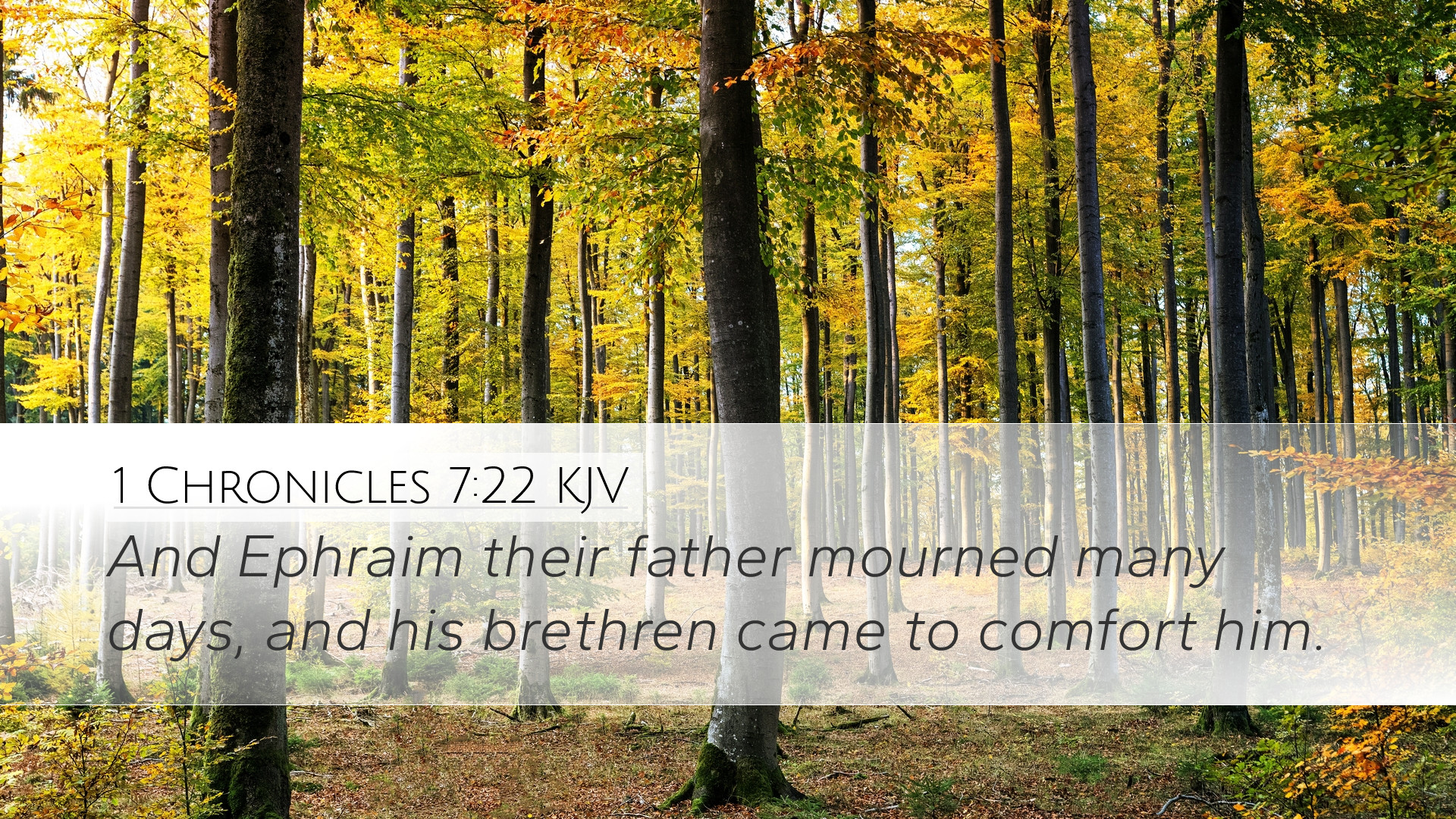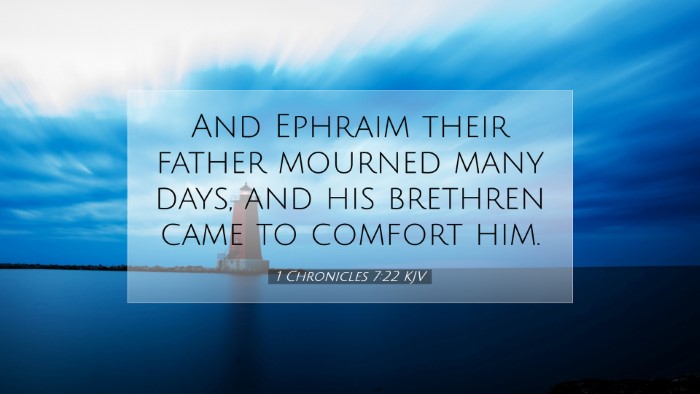1 Chronicles 7:22 Commentary
Verse: 1 Chronicles 7:22 - "And Ephraim their father mourned many days, and his brethren came to comfort him."
Introduction
This passage recounts the deep sorrow of Ephraim, the father of a lineage known for its significant and often tumultuous history. The mourning mentioned in the verse serves as a pivotal moment not only for Ephraim but also for understanding the broader narratives of the Israelite tribes.
Mourning of Ephraim
Matthew Henry's Commentary: Matthew Henry emphasizes the emotional weight of Ephraim's mourning. He notes that mourning is a natural response to familial loss, especially for a patriarch who has seen the tribulations of his offspring. The mourning reflects Ephraim’s love, anguish, and a deep sense of responsibility for the tribes under his guidance.
Albert Barnes' Commentary: Barnes adds that Ephraim’s mourning indicates the gravity of the situation that befell his family. He highlights that in the face of personal loss, the act of mourning can draw communities closer. Ephraim’s lamentation led to his brethren's compassionate response, showcasing the shared experiences of grief among families.
Adam Clarke's Commentary: Clarke offers a theological perspective on the significance of mourning in the life of Ephraim. He illustrates that mourning is not only a sign of personal grief but also a crucial part of communal life among the Israelites, where collective sorrow could lead to deeper communal bonds. Clarke also reflects on the implications of such mourning on spiritual life and the need for divine comfort.
The Role of Brethren in Comforting
Matthew Henry's Insights: Henry points out that the coming of Ephraim’s brethren to console him highlights the importance of community and support during periods of grief. He notes, “When we are in trouble, we need not only the comfort of God but also the comfort of friends.” This encapsulates the human need for companionship in times of distress.
Albert Barnes’ Perspective: Barnes underlines the textual implication that comforters are not merely passive observers; they are actively engaged. His commentary stresses the role of brethren as agents of healing, emphasizing their responsibility to uphold one another amidst sorrow.
Adam Clarke's View: Clarke elaborates further, teaching that the act of comforting signifies unity and support in the Israelite culture. He asserts that this model of comfort is a reflection of God’s own nature—He comforts us so we, in turn, can comfort others. Clarke highlights key scriptural references that speak to this divine principle.
Theological Reflections
This verse presents several theological reflections for pastors, students, and scholars to consider:
- The Reality of Grief: The account of Ephraim's mourning serves as a reminder of the inevitability of grief in the human experience. The Bible does not shy away from depicting the raw emotions associated with loss, providing a framework for understanding our own lamentations.
- The Importance of Community: The brethren’s response to Ephraim illustrates the importance of community in times of sorrow. The church today still carries this responsibility to bear one another's burdens.
- God’s Comfort: The scripture connects the notion of sorrow with divine comfort, emphasizing that God uses relationships for our healing. The brethren’s comfort to Ephraim mirrors the comfort God provides through His presence and Word.
Application for Today's Believers
As contemporary believers, this passage invites reflection on how we respond to grief—both personally and within our communities. It encourages us to offer genuine support to those who mourn, following the biblical model provided in this account.
Furthermore, it suggests that while mourning is a part of the human experience, seeking and providing comfort is vital. Churches can cultivate environments where grief is understood and shared, fostering a sense of belonging and healing.
Conclusion
1 Chronicles 7:22 serves as a poignant reminder of the reality of mourning and the potency of community support. The insights drawn from the commentaries encourage believers to acknowledge their grief and to actively seek to comfort one another, reflecting the love and compassion that God demonstrates towards His people.


